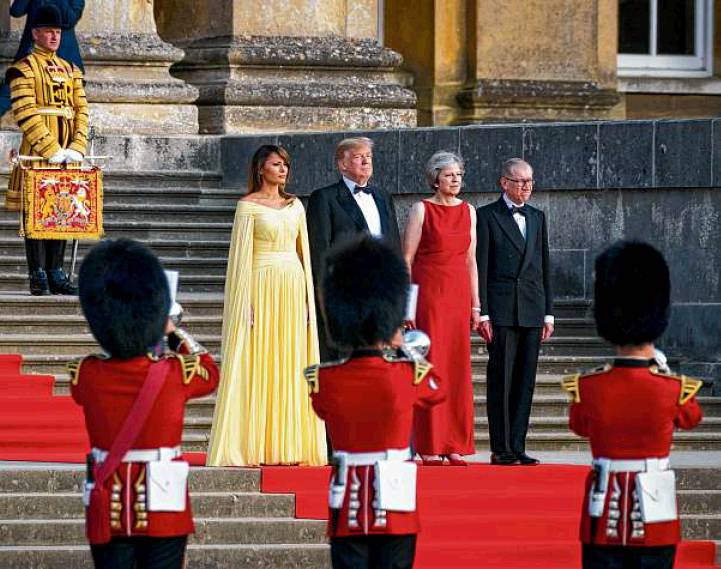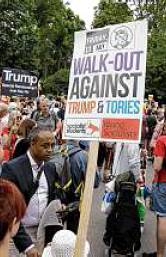Trump rattles Britain after unsettling NATO
President rips UK prime minister in interview after stirring discord among other European allies
By Julie Hirschfeld Davis, Katie Rogers and Steven Erlanger NEW YORK TIMES
LONDON — President Donald Trump put his brand of confrontational and disruptive diplomacy on full display Thursday, unsettling NATO allies with a blustering performance in Brussels and then, in a remarkable breach of traditional protocol, publicly undercutting Prime Minister Theresa May of Britain hours after landing in her country.
NATO, a pillar of the global order, emerged from its two-day confrontation with Trump on Thursday intact but distracted and rattled, a further challenge to the alliance as it faces an expansionist Russia and growing authoritarianism among some of its own members.
Wrapping up talks with fellow leaders of the 29-nation trans-Atlantic alliance, Trump reaffirmed support for NATO, but only after stirring more discord with a vague threat that the United States could go its own way if the allies resisted his demands for additional military spending, capping a summit punctuated by his escalating complaints.
He then flew to Britain, where the newspaper The Sun published an interview that in its bluntness and criticism of May on her own turf all but dispensed with diplomatic norms.
In the midst of a week that has seen May parrying threats to her hold on power, Trump second-guessed her handling of the main issue on her plate: how Britain should cut its ties to the European Union.
He cast doubt on whether he was willing to negotiate a new trade deal between Britain and the United States and praised May’s Conservative party rival, Boris Johnson, as a potentially great prime minister.
The interview was published as Trump and May were wrapping up what appeared to be a chummy dinner at Blenheim Palace — earlier, they had walked inside holding hands — and a day ahead of the president’s scheduled meeting with Queen Elizabeth II at Windsor Castle. There was no immediate response from the British government.
New twist on relations
The day amounted to a global disruption tour unlike anything undertaken by any other recent U.S. leader, and it seemed to be a new twist on the “special relationship” between Britain and the United States.
Mixing pique, self-congratulation and a relentless focus on whether the United States is being taken advantage of by its closest allies, Trump spent his final hours at the NATO meeting in Brussels bludgeoning other leaders but got little in the way of concrete results.
In the latest example of his penchant for creating conflict to draw attention to his agenda, he first demanded an emergency meeting to address his grievances and then called a news conference — something he has not done in the United States in more than a year — to claim “total credit” for having pressed NATO members into increasing their military budgets “like they never have before.”
It was a classic Trump performance — bluster, confrontation and demands followed by a unilateral declaration of victory — but his claim was quickly dismissed by the leaders of Italy and France, who disputed they had made any new pledges for increasing spending, adding to the sense of disarray.
His willingness to criticize May in her own country only underscored the tensions in his relations with other allied leaders and his totally unconventional approach to diplomacy.
But the NATO summit did produce some substantive accomplishments for those who support the alliance’s traditional focus on maintaining security against Russia. The leaders, including Trump, had signed on to a statement — issued after the first day of the meeting rather than at its conclusion, reducing the chances that the president might change his mind about it — that highlighted agreement on a plan to improve the readiness and mobility of the armed forces across the Continent and progress on issues like cybersecurity. And they agreed on tough language aimed at Moscow, especially regarding Russia’s annexation of Crimea.
But with Trump scheduled to meet with President Vladimir Putin of Russia on Monday — and with the Trump campaign’s ties to Russia the focus of a wide-ranging investigation — the gathering of the leaders was dominated not by discussion over how to address security threats or Putin’s efforts to divide the West but by wrangling over money.
Rather than projecting unity ahead of the Trump-Putin meeting, the gathering generated nonstop images of division. Intense concern about the corrosive effects of populism and growing authoritarianism in NATO members like Turkey, Hungary and Poland on support for post-World War II institutions and policies received little or no sustained public attention.
Defends Putin
In the weeks before the summit, alliance leaders feared Trump would try to blow everything up, dealing a truly severe blow to the multilateral world order and to trans-Atlantic deterrence and cohesion.
On Thursday, Trump dismissed concerns that his relationship with Russia was too cozy, or that his hardball tactics at NATO had played into the hands of Putin, whom he is to meet in Helsinki, Finland, next week. But after 48 hours of overt conflict with allies — and the second international summit in two months where he has sparred openly with European leaders — he said he looked forward to a positive encounter with the Russian president.
“I hope that we’re going to be able to get along with Russia; I think that we probably will be able to,” Trump said. “We go into that meeting not looking for so much.”
In the end, some analysts criticized Trump for fabricating a ruckus that, however much it might serve his political ends, was harmful to the alliance.
“NATO always had a good story to tell at this summit, with the communiqué reflecting a robust and resilient alliance that is making real progress on a range of challenges,” said Amanda Sloat, a former State Department official now at the Brookings Institution. “Trump’s belligerent tweets and taunts unfortunately overshadowed what should have been a straightforward message of success.”

